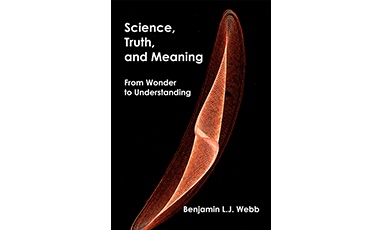Knygoje pateikiamas mokslinis ir filosofinis mūsų vietos pasaulyje nagrinėjimas. Tai atskleidžia žmonijos kelionę nuo ankstyvųjų graikų filosofinių tyrinėjimų iki to, kaip mokslas padarė didelę įtaką mūsų egzistencijos sampratai.
"Mokslas, Tiesa ir prasmė“ yra šio straipsnio pavadinimas knyga because it presents a scientific and philosophical examination of our place in the world. It celebrates the diverse, interconnected, scientific knowledge that mankind has constructed, and describes how it is reducible to a shared foundation. The book explores scientific truth, and confronts whether truth is absolute or relative to who and what we are. It reveals the journey mankind has made from the philosophical enquiry of the early Greeks to how science has profoundly influenced our conception of existence.
The first chapter is entitled ‘Philosophy and science: Paving the way to modern science’, and discusses how questions about the workings of the Visata were once the domain of philosophers, and that that this led to modern science, and scientific method, which became our proven method of determining useable truths about physical reality. The application of scientific method through integrated disciplines utilising a common set of expanding proven principles and rules, enabled us to start to delineate the processes of the Visata. Yet, since science is constrained by the rules governing the interaction of force and matter, philosophical enquiry has, and continues to, enable us to probe possibilities limited only by the creativity of the mind. Hence, philosophy is can be a guide as to what might be, whereas science uses this to determine what is.
Chapters 2 and 3 address the physical world as described by classical and quantum theories. The development and details of these two models encapsulate our current understanding of the fundamental nature of physical reality. Classical, and the later quantum, physics describe with incredible accuracy the behaviour of the largest and smallest objects in the Visata, respectively. Yet, primarily, they are incompatible and conflicting theories. Classical physics defines the processes of the very large (such as galaktikos) acting over huge expanses of space and time, whereas quantum theory explains the behaviour of the very small (such as subatomic particles). To unite these two independently accurate descriptions into one grand theory of everything is the holy grail of science.
4 ir 5 skyriai yra susiję su biologiniu pasauliu – kas mes esame ir kaip atsiradome. Nors ankstesniuose skyriuose pateiktos teorijos grindžia, kaip jėga ir materija sąveikauja, kad sukurtų fizinius reiškinius, jose neaprašoma, kaip žmonės supranta visą makroskopinį elgesį, o ne gyvų būtybių elgesį. Šiame skyriuje aptariami ir fiziniai mechanizmai, leidžiantys gyvai būtybei gyventi, ir tai, kaip organizmai ir rūšys vystosi per daugelį milijonų metų.
Įvertinę, kas esame, kaip atsiradome, kokia yra erdvė, kurioje egzistuoja ir kaip ji konstruojama, galime apeiti visą ratą ir iš naujo spręsti esminius pirmojo skyriaus filosofų klausimus. Taigi 6 ir 7 skyriai yra susiję su tuo, kas yra „protas“ ir kaip jis sąveikauja su pasauliu. Žmogaus prasmės ieškojimas pasitelkdamas mokslo rėmus kaip pagrindą atskleidžia, kad nors į kai kuriuos klausimus apie mūsų egzistavimą galima atsakyti, papildomos žinios prideda naujų problemų, kurių anksčiau nebuvo. Darome išvadą, kad daug ko dar nežinome ir galbūt niekada nesužinome. Iš tiesų, mes pastebime, kad tiesa yra santykinė, o ne absoliuti sąvoka.
The difficulties in obtaining the truth we seek about our place in the Visata are linked not only to our understanding of many concepts, such consciousness, free will, and determinism, but also the very limitations on our mental capacity imposed on us by reality itself. Yet, in finding that certain questions cannot be answered, a firmer grounding of what is possible for a human mind to understand enables us to focus of what is important and achievable.
***
APIE AUTORIŲ
Benjaminas LJ Webbas
Dr Webb pagal profesiją yra biochemikas ir molekulinis biologas, daugiausia turintis virusologijos ir vėžio tyrimų patirties tiek akademinėje bendruomenėje, tiek šiuo metu biotechnologijų pramonėje. Jo daktaro laipsnis buvo įgytas Londono imperatoriškajame koledže, o vėliau užėmė mokslines pareigas tokiose institucijose kaip Londono universiteto koledžas ir Cancer Research UK. Jo domėjimasis šioje knygoje aptartomis temomis prasidėjo prieš 20 metų kaip asmeninė tyrimo kelionė, kurios tikslas buvo įgyti platesnį supratimą apie tai, kaip tiksliai mokslas gali paaiškinti fizinę tikrovę. Šie tyrimai baigėsi šioje knygoje.
Tinklaraščiuose išreikštos nuomonės ir nuomonės yra tik autoriaus (-ų) ir kito (-ų) bendradarbio (-ų), jei toks yra.






































